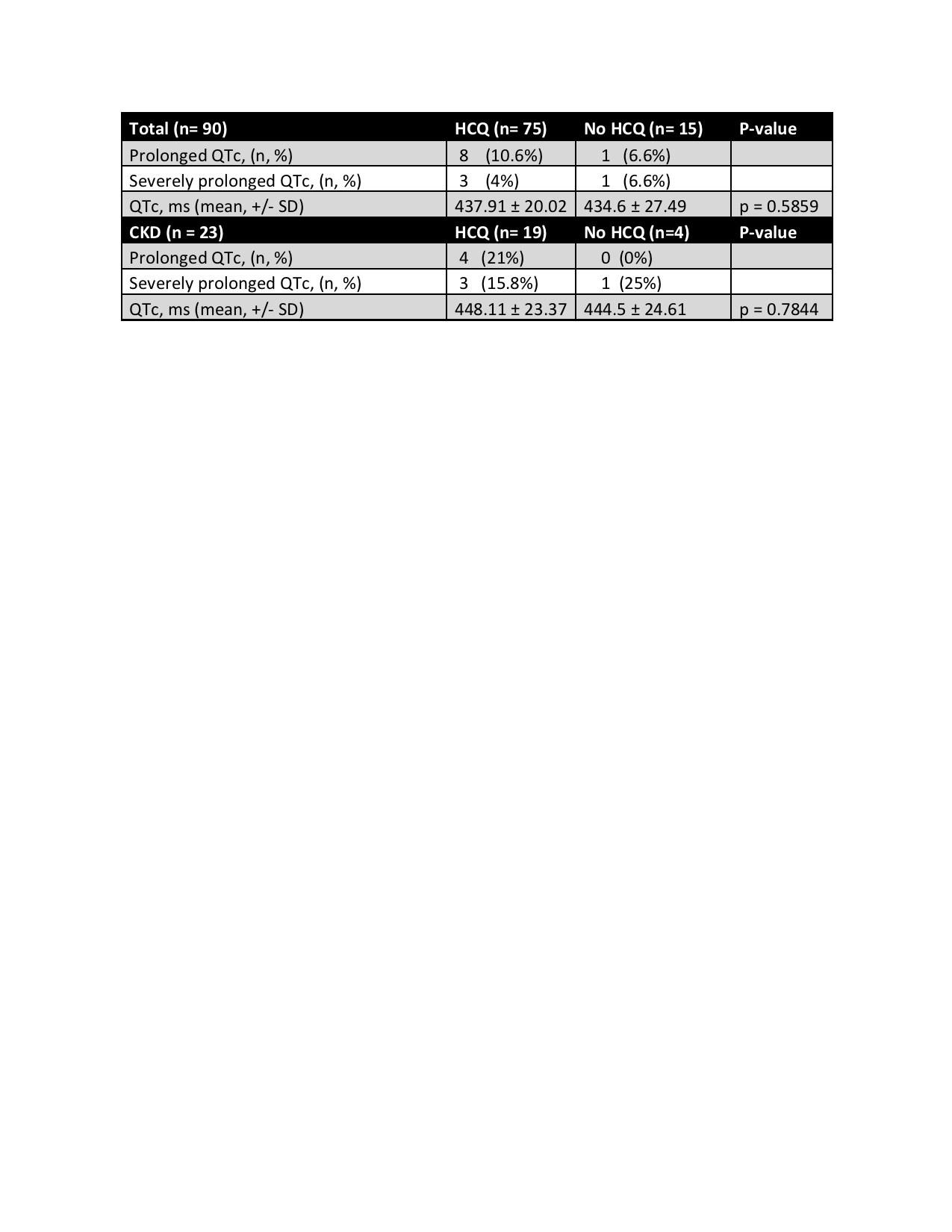Session Information
Date: Monday, November 9, 2020
Title: SLE – Treatment Poster II
Session Type: Poster Session D
Session Time: 9:00AM-11:00AM
Background/Purpose: Hydroxychloroquine (HCQ) is an antimalarial drug used in the treatment of systemic lupus erythematous (SLE). Cardiac toxicity is very rare in SLE, but has been reported in patients with ESRD. The normal corrected QT (QTc) interval is defined as 450 ms in males and 470 ms in females. Severe prolongation of QTc is defined as > 500 ms and is associated with higher risk of developing life threatening arrhythmias such as Torsades de pointes (Tdp). The purpose of this study was to compare QTc intervals in a cohort of SLE patients based on HCQ exposure and with and without chronic kidney disease (CKD).
Methods: Retrospective Epic EMR review of 194 SLE patients fulfilling criteria in a faculty practice at NYU Langone Health between 3/12/12 – 5/1/20. Data was collected on EKG, QTc of first and last EKG (QTc prolongation defined as: > 450 ms in males or > 470 ms in females. Severe QTc prolongation defined as > 500 ms), creatinine and demographics. CKD defined as eGFR < 60 ml/min.
Results: 90 of the 194 patient had at least one EKG. Of these 90 patients, 91% were female, 32.2% African Americans, 6.6% Asian, 38.8% Caucasian, 20% Hispanic, 2.2% other and 75 on HCQ and 15 not on HCQ. QTC was prolonged in 8/75 HCQ and 1/15 without HCQ (table 1). There was no significant difference in mean QTc interval based on HCQ use (p= 0.586). In the 23 patients with CKD, QTC was prolonged in 4/19 on HCQ and 0/4 without. In patients with CKD there was no significant difference in mean QTc interval based on HCQ use (p= 0.784). No patients had documented tachyarrthymia or Tdp.
Conclusion: In a cohort of SLE patients, at least one EKG was available in 46%. There was no significant difference in mean QTc based on HCQ use. Patients with CKD were more likely to have prolonged QTc when compared to those without CKD, but there was no significant difference in mean QTc based on HCQ use as well in this subset. Severe prolongation of QTc was rare in all groups and no episodes of serious tachyarrhythmia or Tdp were observed. A role for more severe stages of CKD, underlying heart disease, or concurrent use of drugs that also affect QTc was not studied. The data supports current standard of care which does not require monitoring with baseline and serial EKGs in the routine management of SLE patients on HCQ. It remains uncertain if the effect of HCQ on the conducting system is limited to a physiological result yet is clinically inconsequential absent other risk factors.
 Table 1: Effect of HCQ on QTc interval
Table 1: Effect of HCQ on QTc interval
To cite this abstract in AMA style:
Haj-Ali M, Belmont H. Hydroxychloroquine and QTc Prolongation in a Cohort of SLE Patients [abstract]. Arthritis Rheumatol. 2020; 72 (suppl 10). https://acrabstracts.org/abstract/hydroxychloroquine-and-qtc-prolongation-in-a-cohort-of-sle-patients/. Accessed .« Back to ACR Convergence 2020
ACR Meeting Abstracts - https://acrabstracts.org/abstract/hydroxychloroquine-and-qtc-prolongation-in-a-cohort-of-sle-patients/
